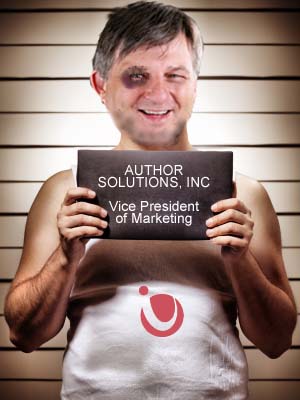 Writer and self publishing guru David Gaughran has long been a scourge of Author Solutions and other players in the assisted self-publishing space whose terms, he insists, amount to little more than an updated version of vanity press.
Writer and self publishing guru David Gaughran has long been a scourge of Author Solutions and other players in the assisted self-publishing space whose terms, he insists, amount to little more than an updated version of vanity press.
Scourge hardly does justice to his relentless pursuit of the platform. And he just Tweeted a fascinating record of an exchange, relayed by marketing savant Emily Suess, between an anonymous author and an Author Solutions staffer, one Eric Emlinger, Publishing Consultant, who dismissed its critics as “websites that are being sued for racketeering.”
Emlinger originally contacted the author through iUniverse, another Author Solutions brand. When challenged on the connection, he said the company’s critics were “essentially hiring people to write bad reviews about big companies. I don’t expect you to believe me, all I can tell you is the facts.”
Well of course Emily might be making it up. She doesn’t look like my idea of a racketeer, but then again, who knows? Then again again, unless she’s an Illuminati fronter, she also doesn’t look deep-pocketed enough to pay people to write bad things about big companies. (Boy, I wish someone would pay me to do that…)
But the one truly awful, inescapable, undeniable fact is the one at the end of Emlinger’s email:
“Author Solutions, the parent company of iUniverse, is a Penguin Random House Company.”
Yes, the world’s new number one publishing conglomerate owns such an outfit, that is capable of addressing its critics in such terms. That might be the one take-away you really need to know about Big Publishing.
































Most of the “author assist” operations are indeed a modern version of vanity publishing. Nothing wrong with vanity publishing per se; the problem is that traditionally almost all the vanity publishers would mislead authors in many ways, and do a lousy job of the production itself.
Of course, most of the stuff is hardly worth putting ink to paper. Or electrons to screen.
Some of the worst of the vanity publishers are owned by big conglomerate publishers. They not only prey upon the writer’s dream of being published, they also offer a false sense of respectability because of the parent company, and many also offer the almost nonexistent possibility of being picked up by one of the conglomerate’s “real” publishing lines if their book sells very, very successfully.
What they don’t tell authors is the system is set up so that’s it’s nearly impossible to make all those sales because of the poor distribution, over-priced books, and lack of editorial overview.
For those who aren’t in the biz, here’s a general definition of the different types of self-publishing.
SELF-PUBLISHING: The author must find a printer, editor, etc., and must pay for each service, then must find the distribution services, as well. All profit goes to the author.
SELF-PUBLISHING THROUGH A ONE-STOP PRINTER OR E-PUBLISHING SERVICE: Some printers offer all the services necessary to publish a book. Each service is paid by the author. All profit goes to the author.
VANITY/SUBSIDY PRESS: They offer all the services necessary to publish a book like the one-stop printer. You can buy in for the basic service, then you can add on various services like editing, cover art, etc. The vanity/subsidy press, however, then takes a large cut of the profit with no risk or cost to itself. Often, it will tie up your rights so you can never publish it elsewhere.
Only the very ignorant or those who are drunk on the dream of publishing, go for the vanity/subsidy press route.